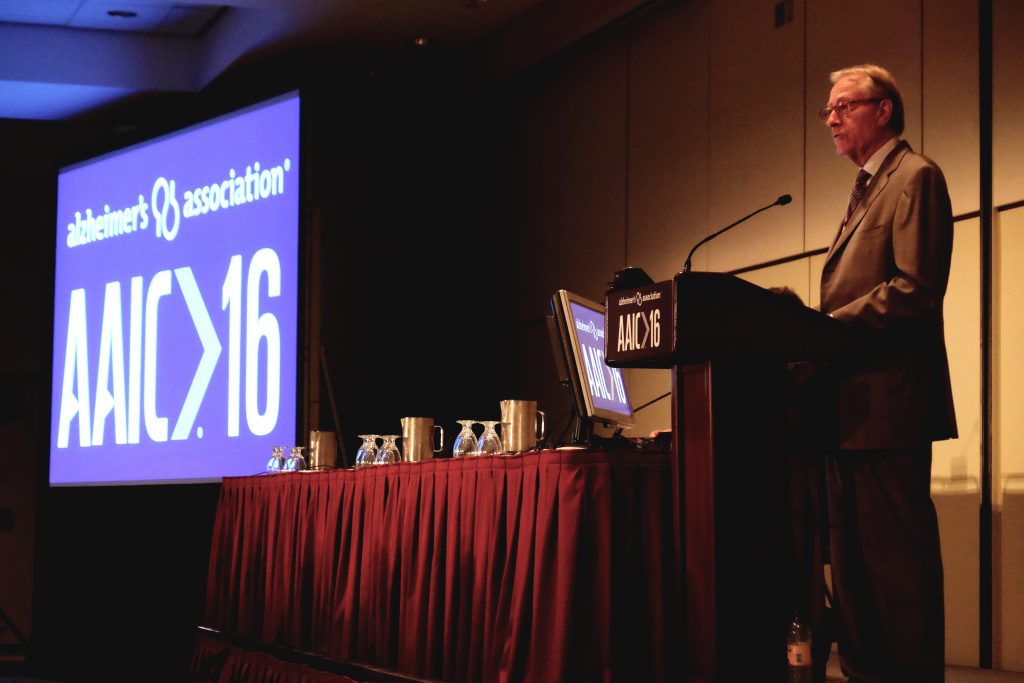Senate Committee Studies Dementia

Since February 2016, the Senate Committee on Social Affairs, Science and Technology has been studying the issue of dementia. After completing a number of public hearings, the committee is writing a report on its findings, which will contain key recommendations to show how Canada can play a leading role in addressing this critical and growing social issue.
Read the ReportRead the Executive Summary
While the committee heard evidence from dozens of experts in medicine, policy and research over the course of its months of study, one of the most affecting presentations came from a group of people with dementia.
On May 18, 2016, four representatives from the Ontario Dementia Advisory Group shared compelling testimony about their diagnoses, how their lives have changed and what Canadians can do to help. Tellingly, they said dementia patients are rarely consulted in matters relating to their own advocacy.
The committee is playing a vital role in ensuring that the voice of the underrepresented, like dementia patients, is heard. It is expected to release its final report in the fall.
Improving dementia policy in Canada
Senator Art Eggleton, deputy chair of the Senate Committee on Social Affairs, Science and Technology, attended the Alzheimer’s Association International Conference in Toronto on July 25, 2016. The former Toronto mayor provided a glimpse of the committee’s observations in a speech to the conference, took part in a panel discussion and held informal meetings with researchers to learn more about how the Senate can help people with dementia.
On his first day at the conference, Senator Eggleton joined a group of panelists to speak about developments in dementia policy and research.
“It is a privilege to be here in the company of people who are doing such strong work to help the three-quarters of a million Canadians suffering from dementia,” the senator said.

Speaking to a number of academics and researchers, he shared some of the evidence he and his fellow senators have heard. Insufficient medical graduates in this specialist field, a service imbalance between urban and rural areas and an un-coordinated health care system are all challenges that need to be addressed, Senator Eggleton said.
“Funding gets awarded without regard for the full picture, and the health care system seems to focus on illness — it’s reactive, instead of preventative,” he said.
“A more coordinated approach could improve services for Canadians with dementia and make better use of the available resources.”
While medical specialists play important roles, the panelists emphasized the need to focus on the development of primary care teams — the doctors, nurses, social workers and family members who are in direct contact with patients.
One audience member asked how the federal-provincial relationship plays into actual reform, considering healthcare is largely the domain of the provinces.
The senator said the committee’s sweeping national study gives a full picture of the strengths and weaknesses of the system. Armed with a complete grasp of the facts and evidence of how other countries are working to combat dementia, senators will issue recommendations next year that can inspire wholesale change at all levels of government.
A coordinated, national dementia strategy will be far more efficient than a series of stopgap solutions and quick fixes.
“People with the disease can live happy and productive lives for years — if they have the right support,” concluded Senator Eggleton.
Related articles
Tags
Committee news
Senate Committee Studies Dementia

Since February 2016, the Senate Committee on Social Affairs, Science and Technology has been studying the issue of dementia. After completing a number of public hearings, the committee is writing a report on its findings, which will contain key recommendations to show how Canada can play a leading role in addressing this critical and growing social issue.
Read the ReportRead the Executive Summary
While the committee heard evidence from dozens of experts in medicine, policy and research over the course of its months of study, one of the most affecting presentations came from a group of people with dementia.
On May 18, 2016, four representatives from the Ontario Dementia Advisory Group shared compelling testimony about their diagnoses, how their lives have changed and what Canadians can do to help. Tellingly, they said dementia patients are rarely consulted in matters relating to their own advocacy.
The committee is playing a vital role in ensuring that the voice of the underrepresented, like dementia patients, is heard. It is expected to release its final report in the fall.
Improving dementia policy in Canada
Senator Art Eggleton, deputy chair of the Senate Committee on Social Affairs, Science and Technology, attended the Alzheimer’s Association International Conference in Toronto on July 25, 2016. The former Toronto mayor provided a glimpse of the committee’s observations in a speech to the conference, took part in a panel discussion and held informal meetings with researchers to learn more about how the Senate can help people with dementia.
On his first day at the conference, Senator Eggleton joined a group of panelists to speak about developments in dementia policy and research.
“It is a privilege to be here in the company of people who are doing such strong work to help the three-quarters of a million Canadians suffering from dementia,” the senator said.

Speaking to a number of academics and researchers, he shared some of the evidence he and his fellow senators have heard. Insufficient medical graduates in this specialist field, a service imbalance between urban and rural areas and an un-coordinated health care system are all challenges that need to be addressed, Senator Eggleton said.
“Funding gets awarded without regard for the full picture, and the health care system seems to focus on illness — it’s reactive, instead of preventative,” he said.
“A more coordinated approach could improve services for Canadians with dementia and make better use of the available resources.”
While medical specialists play important roles, the panelists emphasized the need to focus on the development of primary care teams — the doctors, nurses, social workers and family members who are in direct contact with patients.
One audience member asked how the federal-provincial relationship plays into actual reform, considering healthcare is largely the domain of the provinces.
The senator said the committee’s sweeping national study gives a full picture of the strengths and weaknesses of the system. Armed with a complete grasp of the facts and evidence of how other countries are working to combat dementia, senators will issue recommendations next year that can inspire wholesale change at all levels of government.
A coordinated, national dementia strategy will be far more efficient than a series of stopgap solutions and quick fixes.
“People with the disease can live happy and productive lives for years — if they have the right support,” concluded Senator Eggleton.


